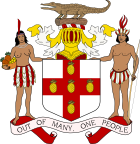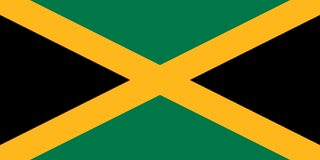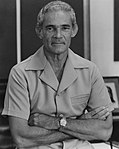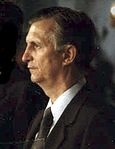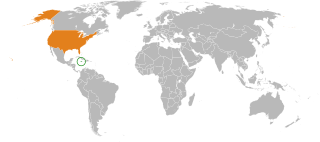
The Caribbean island of Jamaica was inhabited by the Arawak tribes prior to the arrival of Columbus in 1494. Early inhabitants of Jamaica named the land "Xaymaca", meaning "Land of wood and water". The Spanish enslaved the Arawaks, who were so ravaged by their conflict with the Europeans and by foreign diseases that nearly the entire native population was extinct by 1600. The Spanish also transported hundreds of West African slaves to the island.
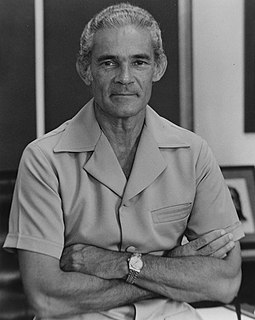
Michael Norman Manley ON OCC was a Jamaican politician who served as the fourth Prime Minister of Jamaica from 1972 to 1980 and from 1989 to 1992. Coming from a prosperous background, Manley was a democratic socialist. According to opinion polls, he remains one of Jamaica's most popular prime ministers.
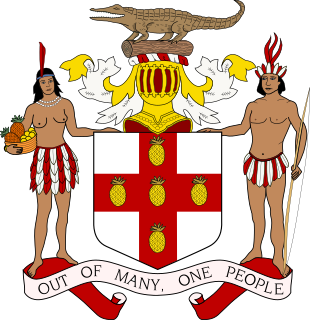
The Prime Minister of Jamaica is Jamaica's head of government, currently Andrew Holness. Holness, as leader of the governing Jamaica Labour Party (JLP), was sworn in as Prime Minister on 3 March 2016, succeeding People's National Party (PNP) leader Portia Simpson-Miller. This was a result of the JLP's victory in Jamaica's 25 February 2016 general election.
The Jamaica Labour Party (JLP) is one of the two major political parties in Jamaica, the other being the People's National Party (PNP). While its name might suggest that it is a social democratic party, the JLP is actually a conservative party. However, it has longstanding ties to the Jamaican labour movement.
The One Love Concert was a large concert held on 22 April 1978 at The National Stadium in Kingston, Jamaica.

Portia Lucretia Simpson-Miller,, is a Jamaican politician. She served as Prime Minister of Jamaica from March 2006 to September 2007 and again from 5 January 2012 to 3 March 2016. She was the leader of the People's National Party from 2006 to 2017 and the Leader of the Opposition twice, from 2007 to 2012 and from 2016 to 2017.

Early general elections were held in Jamaica on 15 December 1983. The election was boycotted by the main opposition party, the People's National Party, in protest at the refusal of the ruling Jamaican Labour Party to update the electoral roll. Whilst several minor parties participated in the election, most seats were unopposed: in the six seats where voting took place, voter turnout was about 55%, so this translated into a nationwide figure of 2.7%. It allowed the Labour Party to win all 60 seats in the House of Representatives, with their leader, Edward Seaga, continuing as Prime Minister.
Oswald Gaskell Harding CD, QC, OJ is a former Jamaican politician from the Jamaica Labour Party, and the longest-serving senator in the nation's history. He was born in Kingston. Harding was the first person to serve as President of the Senate of Jamaica for two non-consecutive tenures, serving from 1980 to 1984 and from 2007 to 2011. First appointed to the Senate in 1977, he served in the body continuously until 2002, and rejoined the Senate from 2007 until his retirement from politics in 2011. His first period as a senator was the longest continuous tenure in the body's history.

Andrew Michael Holness, ON, MP is a Jamaican politician who has been the Prime Minister of Jamaica since 3 March 2016, following the 25 February 2016 general election. Holness previously served as Prime Minister from October 2011 to January 5, 2012. He succeeded Bruce Golding as Prime Minister, and decided to go to the polls in the 29 December 2011 general election in an attempt to get his own mandate from the Jamaican electorate. He failed in that bid, however, losing badly to the People's National Party led by Portia Simpson-Miller, with the PNP gaining 42 seats to the Jamaica Labour Party's 21. Following that defeat, Holness served as Leader of the Opposition from January 2012 to March 2016, when he once again assumed the position of Prime Minister.
Desmond Gregory Mair is a Jamaican Labour Party (JLP) member of the Parliament of Jamaica representing the Saint Catherine North East constituency.
Sharon Hay-Webster is a Jamaican politician. She was a member of the House of Representatives of the Parliament of Jamaica from 1997 to 2012, representing the People's National Party. She came to international attention after the 2004 Haitian coup d'état, when she escorted Jean-Bertrand Aristide from his temporary exile in the Central African Republic to Jamaica at the invitation of then-Prime Minister of Jamaica P. J. Patterson.

The 2011 Jamaican general election was held on 29 December 2011 in Jamaica. The election was contested mainly between the nation's two major political parties, the governing Jamaica Labour Party (JLP), led by Andrew Holness, and the Portia Simpson-Miller-led opposition People's National Party (PNP). The result was a landslide victory for the PNP which won 42 of the 63 seats, a two-thirds majority.

General elections were held in Jamaica on 25 February 2016. The elections were largely a contest between the governing People's National Party (PNP) and the opposition Jamaica Labour Party (JLP). The result was a narrow victory for the JLP, which won 32 of the 63 seats. One political commentator described the poll as "the closest election Jamaica has ever had".
Shahine Elizabeth Fakhourie Robinson is a Jamaica Labour Party politician, currently serving as the Minister of Labour and Social Security. She is a member of the Parliament of Jamaica for North East Saint Ann. She served briefly as the Transport and Works Minister from late November 2011 to January 2012.
Ian Dave Hayles is a Jamaican politician with the People's National Party. He has been a Member of the Parliament of Jamaica since 2007, and State Minister of Agriculture and Fisheries since 2012.

The Colony of Jamaica gained independence from the United Kingdom on 6 August 1962. In Jamaica, this date is celebrated as Independence Day, a national holiday.
Derrick Austin Rochester, O.J. was a Jamaican politician, trade unionist, and member of the People's National Party (PNP). Rochester served as a member of the House of Representatives for South East St Elizabeth from 1972 to 1980 and a member of the Senate from 1980 to 1983. He then returned to House of Representatives as an MP from South East St Elizabeth from 1989 until his retirement in 2002. A trade unionist who focused on worker negotiations and the country's bauxite industry, Rochester also served as the President of the National Workers Union (NWU) from 1989 to 1993, as well as the NWU island supervisor from 1986 to 1983.

Republicanism in Jamaica is a position which advocates that Jamaica's system of government be changed from a constitutional monarchy to a republic. Both major political parties – the Jamaica Labour Party and the People's National Party – subscribe to the position, and the current Prime Minister of Jamaica, Andrew Holness, has announced that transitioning to a republic will be a priority of his government.
Michael Manley, son of former Prime Minister Norman Manley, was elected Prime Minister of Jamaica in 1972. To address growing inequality in Jamaican society, Manley embarked on several democratic socialist reforms of the state, including land ownership reform, free education from primary to university, and nationalization of certain industries. Such policies had massive popularity among many people in Jamaica, but there were others who either saw the reforms as contrary to their businesses or as a high precursor to a Cuban-style communist government. Beginning in 1974, he was also opposed by the more conservative Edward Seaga of the Jamaica Labour Party (JLP). The JLP used the threat of socialism to build support among property owners and churchgoers, attracting more middle-class support. By 1976 the two politicians hired local gangsters to help them increase their hold on power.
